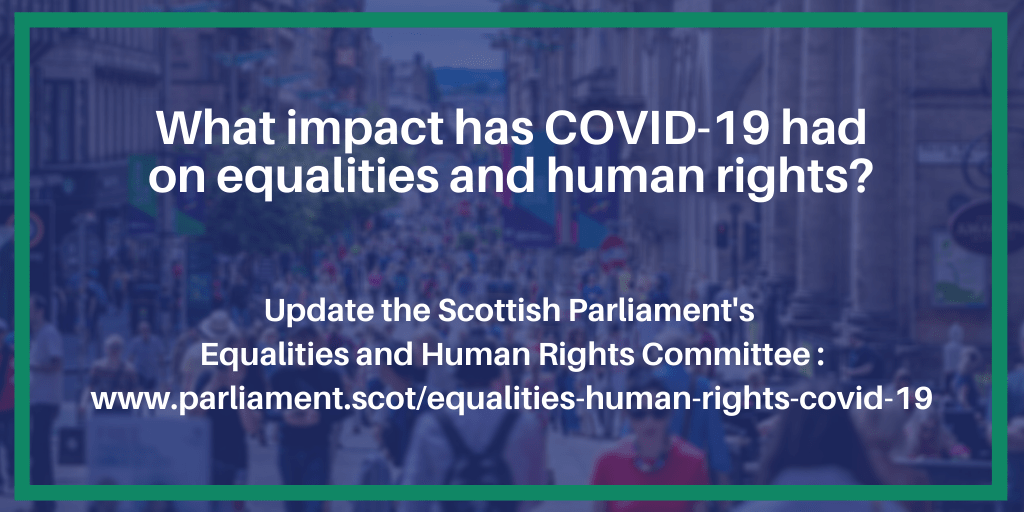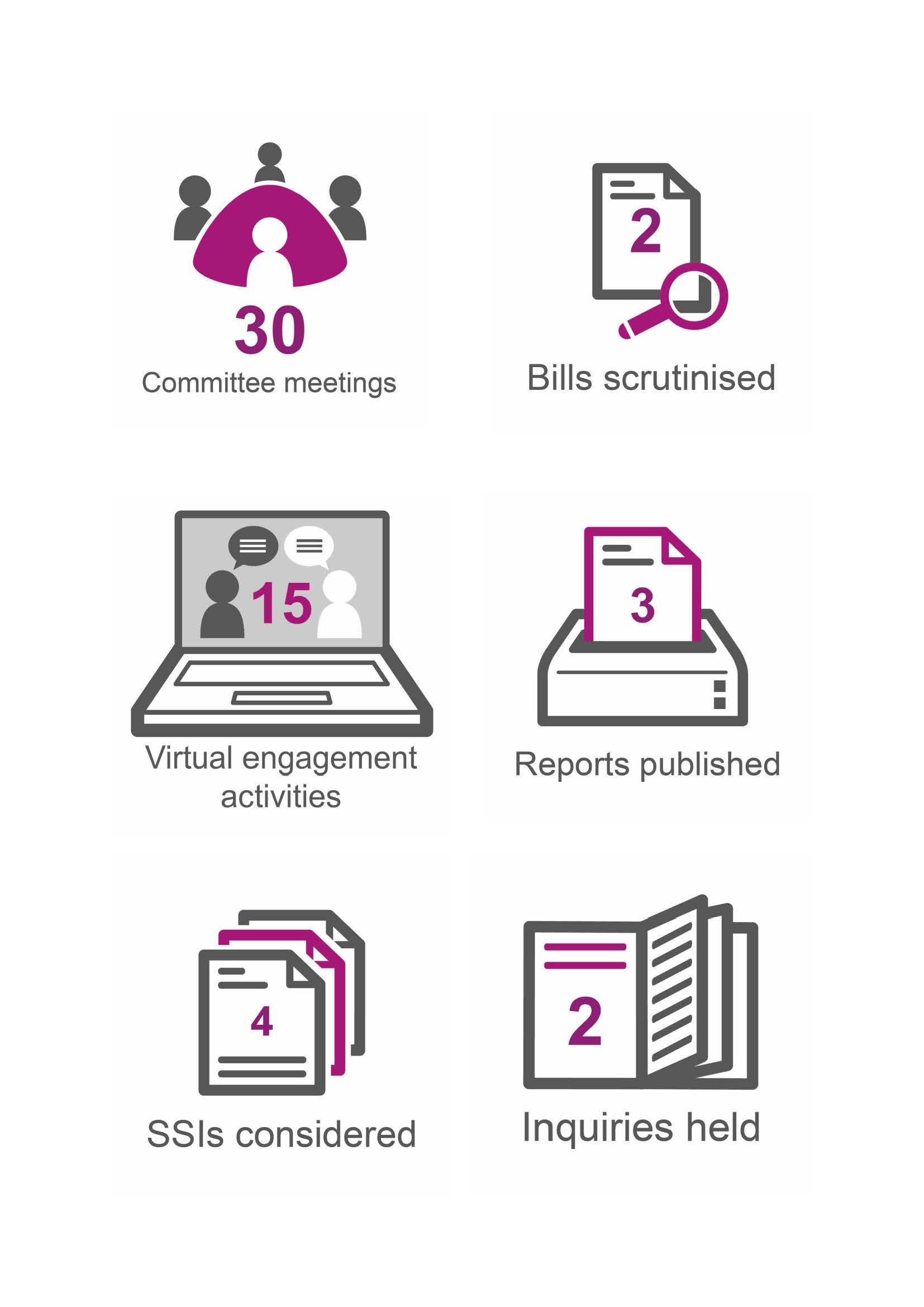Equalities and Human Rights Committee
Equalities and Human Rights Committee Annual Report 2020-2021
Introduction
This annual report covers the period of 12 May 2020 to 24 March 2021, after which the Scottish Parliament will go into the campaign recess period from 25 March to 4 May 2021. The Scottish Parliament agreed on 3 March 2021 to vary Standing Orders so that committees could not meet during the pre-election campaign period (with the exception of the COVID-19 Committee, which may be convened in an emergency). This decision was taken in response to the Scottish General Election (Coronavirus) Act 2021 which provides that the Scottish Parliament will not be dissolved until 5 May 2021 to permit the Parliament to meet to legislate for a new polling date if required.
During the Parliamentary year the Committee met 30 times. All but one of these were held virtually: seven were wholly in private, four in public and nineteen were a mixture of public and private. The Committee took evidence from 92 witnesses of which 52 were female and 40 were male.
Membership changes
Previous members of the Committee during the reporting year:
Maurice Golden (CON) – 25 Feb 2020 to 20 August 2020
Angela Constance (SNP) 3 September 2018 to 31 August 2020
Fulton MacGregor (SNP) 19 April 2018 to 22 December 2020
Inquiries and Reports
Race Equality, Employment and Skills inquiry
The Committee continued with its Race Equality, Employment and Skills inquiry launched on 14 February 2020. Due to the ongoing public health response to the COVID-19 pandemic, the Committee extended its deadline for responses to its call for views to 30 June 2020. Similarly, the deadline was extended for public authorities to respond to the Committee’s letter of 2 March 2020, which asked them to set out the actions they are taking to increase employment of minority ethnic people.
A further letter was sent by the Committee on 13 August 2020, urging public authorities to respond to the inquiry, if they had not already done so.
The Committee received 45 responses from public authorities with a further 22 responses received through citizen space.
On 13 July 2020, the Committee Outreach Department, conducted two virtual engagement sessions on MS teams with representative groups and third sector organisations. The first session heard from Sikh Sanjog, Intercultural Youth Scotland, Radiant and Brighter Community Interest Company and Youth Community Support Agency (YCSA). The second session heard from West of Scotland Regional Equality Council (WESREC). These sessions gathered the views from community organisations on how they felt public authorities should assist with getting people from ethnic minority communities into work and what areas still needed to be improved.
The Committee held four evidence sessions, on 3 September, 10 September, 17 September, and 24 September 2020.
The Committee published its report on 15 November 2020. It identifies several areas of concern about the lack of progress being made by public authorities in response to the Scottish Government’s Race Equality Framework 2016 – 2030.
The Scottish Government responded to the Committee’s report on 24 December 2020. The Committee’s legacy report sets out suggested follow-up actions for its successor committee.
Impact into COVID-19 pandemic on Equalities and Human Rights Inquiry
On 8 April 2020, the Committee agreed to hold an inquiry into the ‘Impact of the COVID-19 pandemic on Equalities and Human Rights’. The purpose of the inquiry was to investigate how groups and individuals had been affected by the pandemic and examine what the Scottish Government and other public bodies needed to do to ensure the correct measures are taken to minimise the negative effect the pandemic may have on equality and human rights.

On 27 April, the Committee launched an open-ended call for views, which allowed organisations to submit multiple submissions as circumstances changed and had strong engagement on twitter. The call for views closed on 1 January 2021 to enable the Committee to produce a final report before the end of the parliamentary session. The Committee received a total of 168 responses through the citizen space platform.
The Committee conducted oral evidence sessions on 28 May, 4 June, 18 June, 25 June and 27 August 2020 from a range of stakeholders including professional bodies, third party organisations and the Minister for Older People and Equalities. Further supporting evidence was submitted by some of the witnesses following the meetings.
The Committee's Outreach Service undertook phone calls with third sector organisations to discuss how groups have been disproportionately affected by COVID-19. The organisations included Dumfries and Galloway Third Sector Interface, West Lothian Third Sector Strategy Group and RNIB Scotland.
The Committee published its report on 2 March 2021. That report includes a dozen recommendations and highlights a broad spectrum of issues and concerns around equality and human rights, protected characteristics and socio-economic disadvantage. These significant issues are covered in detail in the Committee’s legacy report, for consideration by its successor committee.
Legislation
Primary legislation
Civil Partnership (Scotland) Bill
The Committee completed Stage 2 of the Civil Partnership (Scotland) Bill on 11 June 2020.
Stage 3 proceedings took place on 23 June 2020 and the Bill became law on 28 July 2020.
United Nations Convention on the Rights of the Child (Incorporation) (Scotland) Bill
This Scottish Government Bill was introduced by the Deputy First Minister and Cabinet Secretary for Education and Skills, John Swinney MSP, on 1 September 2020. The Committee was designated the lead committee for Stage 1 on 9 September 2020.
The purpose of the Bill is to incorporate the United Nations Convention on the Rights of the Child (UNCRC) which would make it part of Scots Law. Children’s rights would then be legally protected. To make sure that incorporation works, public authorities must not act in a way that’s incompatible with the UNCRC requirements. Courts will have powers to decide if legislation is compatible with the UNCRC requirements and the Scottish Government can change laws to make sure they are compatible with the UNCRC requirements. The Children and Young People’s Commissioner in Scotland would have power to take legal action if children’s rights under the UNCRC are breached. Children, young people and their representatives could also use the courts in Scotland to enforce their rights
The Committee launched a call for views on 16 October 2020 and received 138 responses from members of the public, organisations and a range of stakeholders.
A separate call for views for children and young people was launched on 9 October and closed on 20 November 2020. Information packs were launched to assist schools and groups wishing to provide responses. This received more than 49 responses, including reflective writing, drawings and stop motion videos. More than 70% of the responses were from individual children and young people, which is extremely encouraging.

In addition to the call for views, the Committee undertook seven virtual engagement calls with a range of children and young people who would not ordinarily provide their views directly to Parliament. The virtual outreach engagement calls were with Aberlour, Barnardo’s Scotland, Carers Trust Scotland, Children and Young People’s Centre for Justice, Children in Scotland, Children’s Parliament, Intercultural Youth Scotland, Licketyspit, Scottish Commission for People with Learning Disabilities, Scottish Youth Parliament, Scottish Refugee Council, Scottish Throughcare and Aftercare Forum, Together (Scottish Alliance for Children’s Rights), Who Cares? Scotland and Youthlink Scotland. Organisations hosted the meetings with Committee members, so the children and young people were able to have ownership and lead the sessions.
The Committee took evidence on the Bill at Stage 1 on 12 November, 19 November, 26 November and 3 December 2020.
The Stage 1 report and child friendly version of the report was published on 20 December 2020. Stage 2 was completed on 11 February 2021 and on 16 March 2021, the Parliament condsidered and agreed the Bill at stage 3.
The Committee’s legacy report identifies areas for its successor committee to follow-up on, including the engagement process and implementation of the legislation.
Subordinate Legislation
During the Parliamentary year, the Committee considered the following negative Scottish Statutory Instruments;
19 November 2020 - The Age of Criminal Responsibility (Scotland) Act 2019 (Independent Review of Disclosure of Information) Regulations 2020
14 January 2021 - The Civil Partnership (Scotland) Act 2020 (Commencement No. 3, Saving and Transitional Provision) Regulations 2021 (SSI 2021/23)
4 February 2021 - The Civil Partnership (Scotland) Act 2020 (Commencement No. 3, Saving and Transitional Provision) Regulations 2021 (SSI 2021/23).
18 February 2021 - The Civil Partnership Between Persons of Different Sexes (Prescribed Bodies) (Scotland) Regulations 2021 (SSI 2021/24)
The Committee agreed to make no recommendations in relation to the negative instruments.
Draft Budget Scrutiny 2021-22
The Committee launched a call for views on Pre-budget Scrutiny 2021-22, with a closing date of 18 September 2020.
The purpose of the call for views was to focus on the budgetary impact of Covid-19 on equalities and human rights as we know the challenges faced by people in Scotland. The Committee wanted to hear how COVID-19 affected funding and to look at how the Scottish Government considers equalities and human rights when it makes budget decisions.
The Committee received a total of 13 submissions varying from public authorities to third sector.
The Committee took evidence at its meetings on 1 and 8 October 2020 and wrote to the Minister for Older People and Equalities on 29 October 2020. The Minister replied on 2 February 2021, supported by an annex with responses to the points raised in the Committee’s letter.
Petitions
The Committee considered four public petitions at its meeting on 14 January 2021.
Petition PE1372 – Access to justice in environmental matters: The Committee agreed to close the petition under Rule 15.7 of Standing Orders on the basis that there has been little progress on the action called for in the petition. In closing the petition, the Committee agreed to write to the Scottish Government to highlight the petitioners’ concerns and desire to see progress on this issue.
Petition PE1695 – Access to justice in Scotland: The Committee agreed to close the petition under Rule 15.7 of Standing Orders on the basis that the Scottish Government has indicated its intention to introduce legislative reform. The Committee also agreed to write to the Scottish Government for an update on the timescale for any legislative reform.
Petition PE1787 – The use of Makaton sign language in the legal system: This petition calls on the Scottish Parliament to urge the Scottish Government to ensure that all parts of the legal system use Makaton sign language. It was referred to the Committee on 29 October 2020 The Committeeagreed to keep the petition open and include in its legacy paper for its successor committee.
Petition PE1817– End Conversion Therapy: This petition calls on the Scottish Parliament to urge the Scottish Government to ban the provision or promotion of LGBT+ conversion therapy in Scotland. It was referred to the Committee on 1 October 2020. The Committee agreed to keep the petition open and include in its legacy paper for its successor committee.
Summary Infographic
